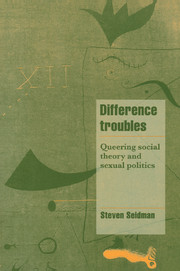Book contents
- Frontmatter
- Contents
- Preface
- Acknowledgements
- Introduction: the contemporary reconfiguring of social theory
- Part I Resisting difference: the malaise of the human sciences
- Part II Engaging difference: from lesbian and gay studies to queer theory
- Part III Democratic prospects: the politics of knowledge and identity
- 8 Transfiguring sexual identity: AIDS and the cultural politcs of sexuality and homosexuality, 1981–1986
- 9 From gay ethnicity to queer politics: the renewal of gay radicalism in the United States
- 10 Postmodern anxiety: the politics of epistemology
- 11 The politics of sexual difference in late twentieth-century America
- 12 Difference and democracy: group recognition and the political cultures of the US, Holland, and France
- Epilogue: pragmatism, difference and a culture of strong democracy
- Notes
- References
- Index
11 - The politics of sexual difference in late twentieth-century America
from Part III - Democratic prospects: the politics of knowledge and identity
Published online by Cambridge University Press: 05 October 2010
- Frontmatter
- Contents
- Preface
- Acknowledgements
- Introduction: the contemporary reconfiguring of social theory
- Part I Resisting difference: the malaise of the human sciences
- Part II Engaging difference: from lesbian and gay studies to queer theory
- Part III Democratic prospects: the politics of knowledge and identity
- 8 Transfiguring sexual identity: AIDS and the cultural politcs of sexuality and homosexuality, 1981–1986
- 9 From gay ethnicity to queer politics: the renewal of gay radicalism in the United States
- 10 Postmodern anxiety: the politics of epistemology
- 11 The politics of sexual difference in late twentieth-century America
- 12 Difference and democracy: group recognition and the political cultures of the US, Holland, and France
- Epilogue: pragmatism, difference and a culture of strong democracy
- Notes
- References
- Index
Summary
It has become commonplace to observe that sex, as much as the economy or education, is a political battleground. Whether our focus is nineteenth-century conflicts in the US around masturbation, sodomy, women's sexuality, prostitution, and the free love movement, or recent conflicts over reproductive rights, gay marriage, pornography, child abuse, and sex education, these aspects of personal life are, as feminists have insisted, indeed political. Moreover, as queer theorists have similarly insisted, sexuality is not only a personal issue that is politicized but is itself a social force. Whatever sexuality might mean for the individual, it functions as a social code, normative framework, principle of social organization or simply put, a way of denning, regulating, and organizing bodies, selves, and populations which produce identities, solidarities, and relations of domination. Hence sexuality may be approached as an analytically autonomous sphere of individual and social determination – a site of desire, identity, social organization, and politics.
But how to interpret conflicts over sexuality? At a minimum I suggest distinguishing two levels of sexual politics. First, there are conflicts over rights, resources, and representations. For example, Americans are divided over sex education, civil rights for homosexuals, funding for family planning, and the legitimacy of public sexual representations. Such divisions point to a sexual stratification system in the US – for example, a system that socially privileges heterosexuality, marriage, two parent families, romanticized sexuality, monogamy, the privatization of sexuality, and so on.
- Type
- Chapter
- Information
- Difference TroublesQueering Social Theory and Sexual Politics, pp. 212 - 236Publisher: Cambridge University PressPrint publication year: 1997

